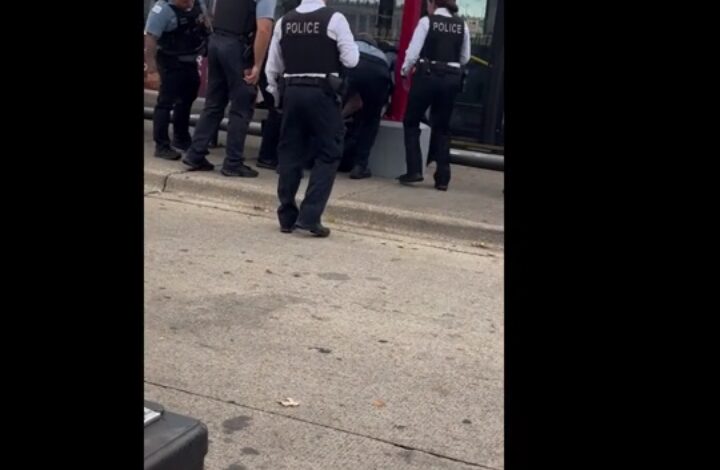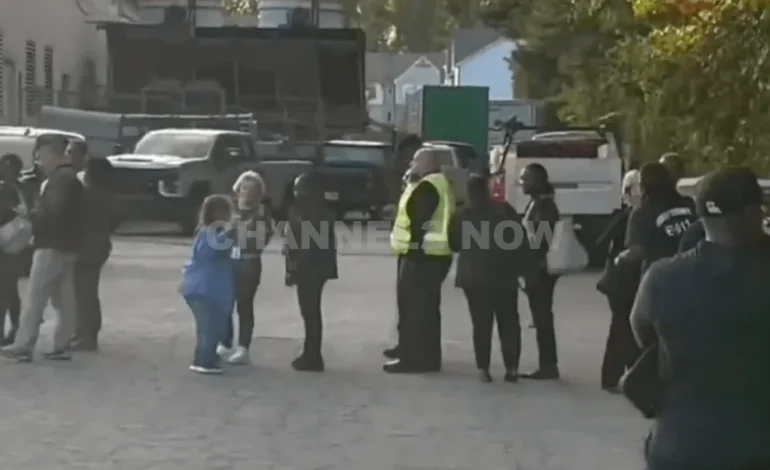
Jonathan Layton, Recently Terminated Employee, Killed in Officer-Involved Shooting After Allegedly Threatening Former Coworkers; Texas Rangers Lead Investigation into Deadly Lindale Incident”
Jonathan Layton, Recently Terminated Employee, Killed in Officer-Involved Shooting After Allegedly Threatening Former Coworkers; Texas Rangers Lead Investigation into Deadly Lindale Incident”
Lindale, TX — On Tuesday, November 5, 2024, a tense police standoff in Lindale, Texas, culminated in the fatal shooting of Jonathan Layton, a former employee who had allegedly threatened his ex-coworkers after being dismissed from his job. The incident, which unfolded at Layton’s residence on County Road 4109, has sparked a thorough investigation by the Texas Rangers into the actions of both the officers and Layton in the moments leading up to his death.
This tragic event has left the community of Lindale grappling with complex emotions, as details surrounding the shooting and Layton’s threats continue to emerge. This article provides a comprehensive overview of the incident, exploring the sequence of events, Layton’s background, community reactions, mental health and workplace safety implications, and the broader dialogue around officer-involved shootings.
Incident Timeline: Escalation from Threats to Fatal Confrontation
The sequence of events began on Tuesday morning when authorities received reports that Jonathan Layton, a recently terminated employee, had made alarming threats against several of his former coworkers. According to sources within the local business, Layton had allegedly contacted these individuals directly, issuing hostile warnings and creating significant concern about the potential for violence.
Upon receiving the report, Lindale law enforcement swiftly mobilized, considering the seriousness of the threats and the risks to public safety. Officers tracked Layton to his residence on CR 4109, an isolated property on the outskirts of Lindale, where they sought to approach the situation cautiously.
When police arrived at the scene, they attempted to establish a line of communication with Layton, aiming to de-escalate the confrontation. According to the official police statement, Layton initially resisted engagement, creating an atmosphere of heightened tension. As officers moved closer, Layton reportedly emerged from the residence holding a handgun, which he raised in the direction of the officers. In response, one of the officers discharged their firearm, striking Layton. Despite the immediate efforts of paramedics who were stationed nearby, Layton was declared dead shortly after being transported to the hospital.
Jonathan Layton: Background and Recent Challenges
Jonathan Layton, 33, had been a resident of Lindale for most of his life and was employed locally until his termination a few days prior to the incident. Friends and former colleagues described him as a quiet, reserved individual who had recently shown signs of strain. Layton’s dismissal, though not publicly detailed, is thought to have been a pivotal event, potentially exacerbating his existing personal challenges.
Family members, speaking anonymously, indicated that Layton had experienced bouts of anxiety and frustration in recent months, particularly surrounding his employment situation. They expressed shock and sorrow over his sudden turn to violence, emphasizing that, to their knowledge, he had never displayed violent tendencies before this event. As the investigation proceeds, officials are expected to review Layton’s employment history and personal background to understand the possible triggers that led to the tragic confrontation.
Law Enforcement Response: Protocols and Procedures in High-Risk Situations
The police response in this case reflects standard protocol when dealing with potentially armed individuals posing a threat to others. Following a report of direct threats, Lindale officers approached Layton’s residence with caution, adhering to policies aimed at reducing the risk of harm to both officers and potential suspects.
In situations involving armed individuals, police departments often rely on specialized training that includes both de-escalation techniques and protocols for the use of force when deemed necessary. Lindale Police Chief Daniel Meyers confirmed that officers were trained in crisis intervention, stating, “Our officers are prepared to handle high-stress situations with the goal of minimizing harm. Unfortunately, in this case, the suspect’s actions left our officer with no other option.”
After Layton’s death, the Lindale Police Department deferred the investigation to the Texas Rangers, who are responsible for conducting independent reviews of officer-involved shootings. This process includes analyzing all available evidence, including body camera footage, statements from all officers involved, and any third-party witnesses who may have been in the vicinity.
The Role of the Texas Rangers in Ensuring Transparency
The Texas Rangers are widely regarded as a respected independent agency for handling sensitive investigations involving law enforcement officers. Their involvement is a critical measure to ensure an unbiased investigation, which is crucial for public trust in cases involving lethal force by police.
In Layton’s case, the Texas Rangers’ investigation will focus on several key factors: the timing of the officer’s response, the perceived threat level posed by Layton, and whether the officers acted within the scope of their training and guidelines. All body camera footage from the scene will undergo detailed review to verify the actions taken by law enforcement during the confrontation.
Community Reactions: Grief, Concern, and a Push for Greater Mental Health Support
The fatal outcome of Tuesday’s incident has left the Lindale community in shock. While many residents understand the risks police officers face, they are also grappling with the loss of life and what might have been done differently. Neighbors and former coworkers of Layton have shared mixed emotions—sadness for the loss, concern for the officers involved, and lingering questions about the availability of mental health support in their community.
Residents and local leaders have expressed particular concern about the potential gaps in mental health resources available to individuals dealing with job loss and other personal crises. Pastor Michael Reed, a prominent community figure, urged the public to support Layton’s family and to address the broader issues that may contribute to such tragedies. “This community needs to come together to grieve and to ensure that our neighbors have the resources they need in difficult times,” Reed said during a gathering at the local community center.
Local businesses have echoed these sentiments, with some discussing potential support programs aimed at offering mental health resources to employees dealing with workplace stress, termination, or other life transitions.
The Broader Issue of Workplace Violence and Mental Health
Incidents like the confrontation with Layton bring renewed focus to the rising issue of workplace violence and the need for stronger mental health support systems. Statistics from the Occupational Safety and Health Administration (OSHA) show that workplace-related violence has been on the rise in the U.S., accounting for nearly 2 million cases each year. Former employees who feel aggrieved or stressed are often a significant risk factor, as was potentially the case with Layton.
According to Dr. Susan Kramer, a psychologist specializing in workplace stress, “The combination of financial strain, personal struggles, and job insecurity can create a pressure cooker situation for individuals. Employers can play a pivotal role by offering counseling, de-escalation training, and support networks.” Dr. Kramer added that while early intervention is crucial, community resources are equally important for individuals navigating difficult times.
Community advocacy groups have echoed these recommendations, pushing for partnerships between businesses, local governments, and mental health agencies to ensure that at-risk individuals have access to preventative mental health care. Providing counseling options, support groups, and workplace training in conflict resolution can help reduce incidents of workplace violence and ensure safer environments for all employees.
A National Perspective on Officer-Involved Shootings: Protocols, Training, and Transparency
The fatal encounter between Jonathan Layton and Lindale law enforcement joins a national conversation on officer-involved shootings, which have sparked debates about law enforcement protocols, training, and transparency. With each incident, communities, activists, and police departments examine the policies in place and look for ways to improve responses, particularly when dealing with armed or distressed individuals.
Across the country, police departments have adopted Crisis Intervention Training (CIT), which teaches officers how to de-escalate situations involving individuals in mental or emotional distress. This specialized training has been instrumental in reducing the number of violent confrontations in many jurisdictions. In Texas, CIT is part of the core training curriculum for officers, and the protocol used by Lindale officers will be a central component of the Texas Rangers’ investigation.
Advocacy groups are also pushing for broader reforms, including routine mental health screenings for officers, increased training in non-lethal interventions, and mandatory body camera policies to ensure accountability. Civil rights groups, including the Texas Civil Liberties Union, have voiced support for these reforms, asserting that increased transparency is vital for public trust.
Reflections on Mental Health Support and Community Safety
The tragic end to Jonathan Layton’s life underscores the gaps that often exist in mental health support, especially in smaller communities with limited resources. Individuals dealing with job loss, financial stress, and other personal challenges may struggle to access timely mental health care, which could prevent situations from escalating.
Mental health advocates in Lindale have called for expanding community resources to support residents in crisis. This includes establishing crisis hotlines, community-based support groups, and partnerships with mental health professionals who can offer assistance to those experiencing significant life changes. The Lindale Mental Health Initiative, a grassroots organization, has already begun organizing meetings to raise awareness about mental health needs in the community, highlighting the role of early intervention and support.
A Community Reflects and Heals
As Lindale residents process the aftermath of the incident, community leaders and residents are organizing a vigil to honor Jonathan Layton and offer support to those affected. Local officials have also scheduled a town hall to discuss mental health resources and provide residents with an opportunity to voice their concerns.
Mayor Teresa Reynolds expressed hope that the community can come together to address these challenges and prevent similar tragedies. “This is a painful reminder of the importance of community support and mental health resources. Lindale is a close-knit town, and I have no doubt that we will find a way to emerge from this stronger,” she stated.



